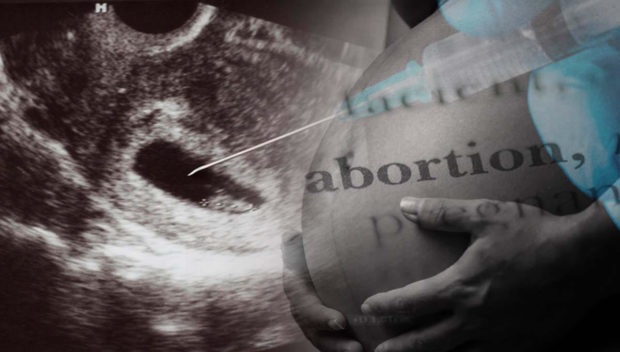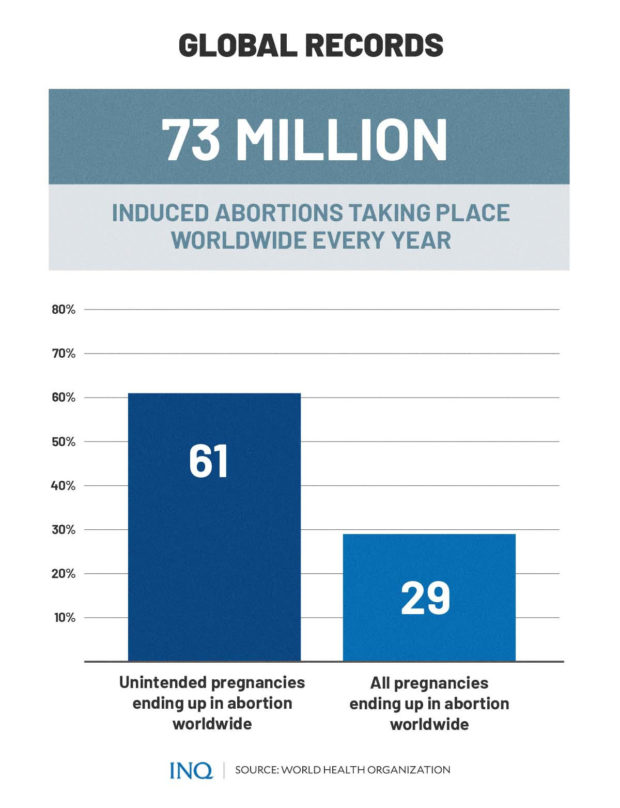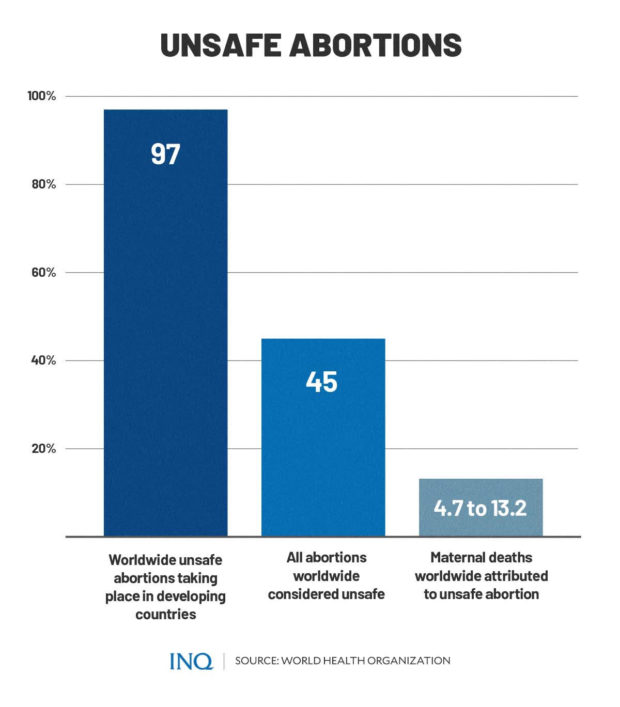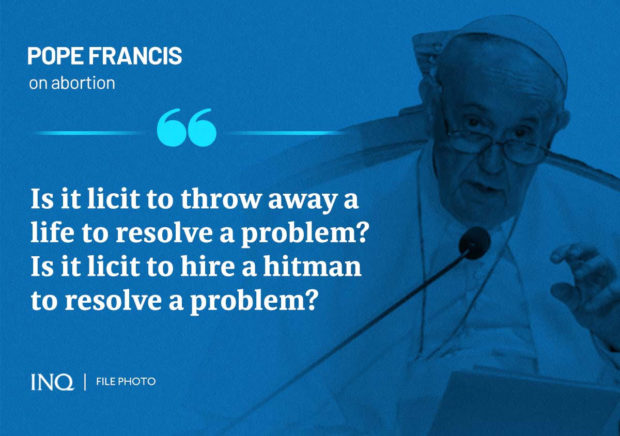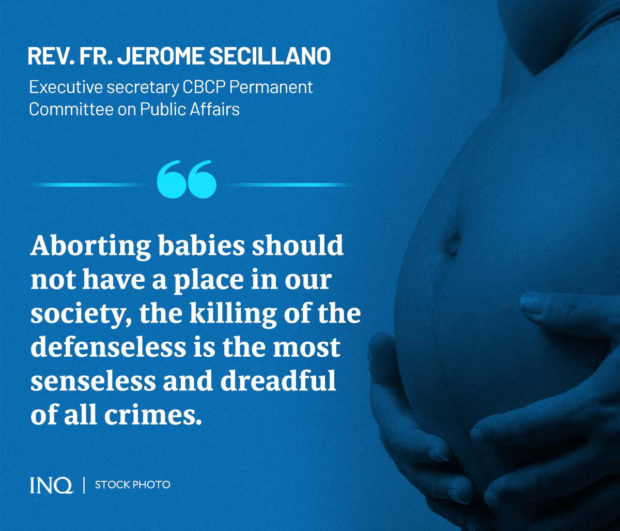Abortion: 2 sides of the coin
MANILA, Philippines—In the Philippines, where abortion—a common health care procedure to end a woman’s pregnancy—remains illegal, the number of women who undergo induced, unsafe abortion continues to increase every year.
Under the 1987 Constitution and the Revised Penal Code, abortion is classified as a criminal offense and is punishable by up to six years in prison for doctors and midwives who perform the medical procedure, and by two to six years in prison for women who undergo the procedure.
Yet, data showed that over 600,000 women induced abortion in 2012. The figures kept increasing and between 2015 and 2018, the number of women who undergo induced abortion increased by 973,000 annually.
By 2020, the numbers were estimated to reach over 1.26 million.
READ: PH’s restrictive abortion laws lead to unsafe abortion, deaths
Unfortunately, since these women undergo unsafe abortions due to the country’s restrictive laws, many of them have died due to post-abortion complications—a “preventable” scenario, according to World Health Organization (WHO).
“As long as abortion is restricted in Philippine law and people impose their religious morality on women seeking life-saving abortion care, women will die and suffer disability from complications from unsafe abortion,” said lawyer Clara Padilla, spokesperson of the Philippine Safe Abortion Advocacy Network (PINSAN), in a statement on Wednesday (June 29).
“It is incumbent upon the Philippine government to decriminalize abortion being the main barrier to women’s access to safe and even post-abortion care,” she added.
Why women in PH get abortion@
“The country’s restrictive laws on abortion have not prevented abortion and have only made it extremely unsafe, leading directly to the preventable deaths of thousands of women each year,” said PINSAN.
The 2012 abortion statistics in the country showed that lack of access to safe and legal abortion has a grave public health impact on women’s lives and health translating to:
- 70 women inducing abortion every hour
- 11 hospitalized women every hour
- Three women die every day from unsafe abortion complications
But, why do Filipino women still undergo the procedure if it could put their life and health in jeopardy?
Guttmacher Institute, in its 2013 report titled “Unintended Pregnancy and Induced Abortions in the Philippines: Causes and Consequences,” Filipino women who have induced abortion cited various reasons for giving up pregnancy.
According to the study, when asked why they sought an abortion, the Filipino women who were part of the study stated the following reasons:
- 72 percent of women cited the economic cost of raising a child
- 54 percent said they already have enough children
- 57 percent answered that the pregnancy occurred too soon after their last one
- 30 percent said their husbands or partners—even family members—do not want the pregnancy
The Women’s Crisis Center’s study titled “Feminist Action Research on Reproductive Health Needs and Concerns of VAW Survivors,” found that unwanted pregnancy as a consequence of rape was one of the main reasons many Filipino women undergo an abortion.
“One of the glaring consequences of rape is unwanted pregnancy. Some women and girls who became pregnant resulting from rape were forced to resort to clandestine and unsafe abortions to end their unwanted pregnancies while others have tried to commit suicide,” said Padilla.
Data from the study showed that the statistics of rape survivors in the country who induced abortion were:
- marital rape: 57 percent
- incest: 27 percent
- rape: 83 percent
“When one’s daughter, sister, wife or mother becomes pregnant as a result of rape, there are many Filipinos who will support their female family member’s decision to undergo such therapeutic abortion, however, even rape survivors are not expressly allowed by Philippine law to undergo abortion,” Padilla said.
“Denying safe and legal abortion to rape and incest survivors is torture, a clear injustice, and patently discriminates against women and girls. Without access to safe and legal abortion, these rape and incest victims end up part of the statistics of women and girls who die from unsafe abortion complications,” she added.
According to data obtained by the Philippine Statistics Authority from the Philippine National Police (PNP) and the Department of Social Welfare and Development (DSWD), more women were raped in 2019.
Data from PNP indicated that there were 2,162 rape cases reported to the authorities in 2019.
In 2015, data from PNP and the Women and Children Protection Center (WCPC) showed that a total of 9,056 women and girls reported they were raped in 2015 with 2,078 adult women and 6,978 children.
This means that a Filipino woman or girl is raped every 75 minutes in 2015.
Filipino women from all walks of life
Guttmacher’s study also found that Filipino women from all segments of society experience abortion.
“Women who have had an abortion resemble average Filipino women: The majority are married, Catholic, and poor. They have some high school education and have already had several children,” the study said.
The majority of women having abortions, according to the study, were:
- 91 percent were married or ever in a union
- 87 percent were Catholic
- 71 percent have had a high school education
- 57 percent already have at least three children
- 68 percent were poor
Moreover, most women who induced abortion in 2012 did not make the decision to end their pregnancy alone.
Around 43 percent of these women said they consulted their husband or partner, while 25 percent discussed the matter with a friend or relative.
In terms of having the procedure done, 33 percent of women who eventually have completed an abortion relied on a husband, partner, relative, friend, or neighbor, “or take steps to end pregnancy themselves.”
At least 15 percent consulted a pharmacist before undergoing an abortion, and another 15 percent consulted either a traditional healer or a street vendor—presumably those who sell bottles of “pamparegla,” a tonic that supposedly induces menstruation.
Only 29 percent of Filipino women in 2012 obtained an abortion from a doctor.
The cost of having a relatively safe abortion procedure was one of the main reasons that many women resorted to having unsafe abortions done by unqualified individuals.
“Because the cost of relatively safe procedures performed by trained providers in hygienic settings (P4,000–15,000 pesos, or US$73–273) is often many times higher than that of unsafe and less effective methods (costing as little as US$1), poor women tend to use unsafe methods.”
Unfortunately, only 30 percent of women who attempt an abortion succeed in having one, and many women try countless times to end a pregnancy.
“With each unsafe attempt at ending her pregnancy—successful or not—a woman increases the risk to her life and health,” the Guttmacher institute stated.
Why decriminalize abortion
Padilla, who is also the founder and executive director of EnGendeRights—a nonprofit organization that advocates for women’s rights, in a previously released statement listed over 20 reasons the Philippine government must decriminalize abortion.
Among these long list of reasons, include:
- To save women’s lives and prevent disability from unsafe abortion complications.
- To reduce maternal deaths related to unintended/unwanted pregnancies and unsafe abortions during humanitarian crises including the COVID-19 pandemic.
- To respect the woman’s personal decision.
- To repeal discriminatory laws against women and eliminate stigma, discrimination, and imposition of oppressive religious beliefs against women who induce abortion.
- To provide incest and rape survivors and sexually exploited/trafficked women the opportunity to end unwanted pregnancies through safe abortion procedures.
- To save the lives of adolescent girls, women with disabilities, and other persons at risk.
- To save the lives of poor women who are at risk due to lack of access to safe abortion.
- To save the lives of women with risky pregnancy conditions.
- To support the prevailing recognition that therapeutic abortion is legal to save the life of the woman and for medical necessity.
- To address unintended/unwanted pregnancies due to lack of access to contraceptives, contraceptive failure rates, and coercive relations.
Padilla also cited the social costs of the country’s lack of access to safe abortion and post-abortion care as one of the reasons the government must decriminalize abortion.
According to her, decriminalizing abortion could help the government save over half a billion pesos “since induced abortion services cost less than treatment of unsafe abortion complications.”
The other reasons cited by Padilla were:
- To uphold women’s fundamental human rights and confirm that women’s rights prevail over prenatal protection.
- To uphold women’s right to equal protection of the law.
- To uphold women’s rights to freedom of thought, conscience, and religion.
- To be in line with the global trend liberalizing abortion laws to lower maternal deaths and morbidities related to unsafe abortion complications.
- To ensure women’s access to wide-acting life-saving essential medicines.
- To adhere to the international health guidance of the WHO and the International Federation of Gynecology and Obstetrics to reduce maternal mortality due to unsafe abortion complications.
- To comply with international human rights standards.
- To ensure women’s access to safe abortion on all grounds since allowing abortion based only on certain exceptions will not suffice.
- To continue the historical fight to uphold women’s rights to equality and non-discrimination and respond to the outstanding clamor to pass the bill into law.
Padilla also cited the “ constitutional guarantee on separation of church and state and non-establishment of religion.”
“Maintaining the restrictive abortion law would violate the principle of separation of church and state and would be tantamount to establishment of religion—allowing certain religious groups to influence our laws, governance, and impose their beliefs on the entire Philippine population in violation of the constitutional guarantee on non-establishment of religion,” she said.
“This would infringe on the right to freedom of religion of women and health providers who want to provide health care to their patients,” she added.
The lawyer said people and their churches are free to voice out their own beliefs, but they must also respect the free exercise of belief of others.
“What the principle of separation of Church and State safeguards is against any particular religion influencing government laws and policies. It is the duty of public officials to ensure that laws and policies do not further the views of any religion but rather ensure that the rights of all citizens are protected.”
Read full statement here:
Padilla, along with PINSAN, drafted a bill to decriminalize abortion, which further discussed key points and reasons why the government must lift penalties imposed for the said medical procedure.
Read the draft of the proposed bill here:
“We believe that this proposed bill will save women’s lives when passed. The country’s restrictive laws on abortion have not prevented abortion and have only made it extremely unsafe, leading directly to the preventable deaths of thousands of women each year,” PINSAN said in a statement released on June 2020.
“We at PINSAN would like to encourage sincere and good faith discussions on the abortion situation in the country, discussions based on facts and evidence that are sound, scientific, and, most importantly, sensitive to the needs and experiences of women, girls, and other gender identities with reproductive capacities at various, intersecting vulnerabilities—including physical, mental, and socio-economic vulnerabilities, among others,” the organization added.
“We believe it is high time the Philippine government decriminalize our antiquated and restrictive law on abortion, in compliance with its international human rights obligations and women’s right to equality and non-discrimination.”
Vatican on faith and abortion
The Vatican praised the US Supreme Court following its decision to officially overturn the landmark 1973 Roe v. Wade ruling recognizing women’s constitutional right to abortion.
READ: U.S. Supreme Court overturns Roe v. Wade, curtailing abortion rights
In 2019, Pope Francis said abortion can never be condoned by the Church, even when the fetus is gravely sick or likely to die.
“Is it licit to throw away a life to resolve a problem? Is it licit to hire a hitman to resolve a problem?” Pope Francis asked during his speech presented at a Vatican-sponsored anti-abortion conference.
“Abortion is never the answer that women and families are looking for. Rather, it is fear of illness and isolation that makes parents waver. The practical, human, and spiritual difficulties are undeniable, but it is precisely for this reason that a more incisive pastoral action is urgently needed to support those families who accept sick children,” the pope added.
“There is a need to create spaces, places and ‘networks of love’ to which couples can turn, and to spend time assisting these families.”
Pope Francis also clarifies that the Church’s stand on abortion “has nothing to do” with faith. He said that the Church sees abortion as a human problem and that it is pre-religious.
He added that religion should not be blamed for a human issue and reminded the people to never eliminate a human life or hire a killer to solve a problem.
Read Pope Francis’ speech here: Address of his holiness Pope Francis to participants in the conference “Yes to life — taking care of the precious gift of life in its frailty” organized by Dicastry for Laity, family and life
According to the Catechism of the Catholic Church, “human life must be respected and protected absolutely from the moment of conception.”
“From the first moment of his existence, a human being must be recognized as having the rights of a person—among which is the inviolable right of every innocent being to life.”
The Philippines, as a predominantly Catholic country, echoes the same views as the Vatican.
“Aborting babies should not have a place in our society, the killing of the defenseless is the most senseless and dreadful of all crimes,” Rev. Fr. Jerome Secillano, executive secretary of the Catholic Bishops’ Conference of the Philippines Permanent Committee on Public Affairs, said over Radio Veritas in 2020.
“Parents should simply allow their children to see the light of day and if they are not up to the task of taking care of them due perhaps to adverse circumstances, they can allow the State or other responsible institutions to take care of their children. We have different means to take good care of children ‘unwanted’ by their parents,” Secillano added.
According to Padilla, other predominantly Catholic countries and territories have already liberalized their abortion laws, including Spain, Belgium, France, Italy, Poland, Hungary, Portugal, Brazil, and Ireland.
“This leaves the Philippines to contend with its antiquated colonial Spanish law—a persisting bondage of colonialism–and only one of a handful countries worldwide which continue to penalize their women and adolescent girls for having an abortion,” she said.
On science vs pro-life debates
In a 2018 article published by The Atlantic, American activist Ashley McGuire—who opposes abortion on moral grounds—said that “[the pro-life message has been, for the last 40-something years, that the fetus … is a life, and it is a human life worthy of all the rights the rest of us have.”
According to Focus on the Family, an American fundamentalist Christian organization, pro-life is defined as a belief that all human life is created equal regardless of size, level of development, education, and degree of dependency.
“Consequently, by this definition, taking the life of a pre-born baby is a violation of the fundamental right to life,” the organization said.
One of the biggest arguments between pro-life individuals and advocates of abortion is the question of when human life begins.
From a biological perspective, American biologist Scott Gilbert—Howard A. Schneiderman Professor of Biology, emeritus, at Swarthmore College—has identified five development stages, all of which are plausible beginnings of human life.
These development stages, Gilbert said, might begin:
- when a zygote is formed with the full human genetic material after the fertilization in the egg duct
- the gastrulation or when the embryo becomes an individual—or “when you can no longer form twins or triplets”—which happens around two weeks after fertilization
- at 24 to 28 weeks of pregnancy when the human-specific brain-wave pattern is detected in the fetus’ brain—the disappearance of this pattern is part of the legal standard for human death
- between 22 to 24 weeks of pregnancy, when the fetus becomes viable or when it can survive outside the womb with the help of available medical technology—which is the one endorsed in the Roe v. Wade decision
- at birth or during the perinatal period where a successful birth is possible.
Read the transcript of Gilbert’s lecture here: When Does Personhood Begin?
“I really can’t tell you when personhood begins, but I can say with absolute certainty that there’s no consensus among scientists,” the biologist said.
Being ‘pro-life’ doesn’t end at opposing abortion
In an editorial on the US Supreme Court’s recent ruling, the Vatican reminded the public that being “pro-life” does not only mean opposing abortion.
Instead, being pro-life means supporting other issues such as those that threaten human life, including rising mortality rates.
“Being for life, always, for example, means being concerned if the mortality rates of women due to motherhood increase,” said Andrea Tornielli, the Vatican’s editorial director.
Tornielli added that being for life means helping women who underwent abortions to welcome new life.
“According to one statistic in the United States, about 75 percent of women who have abortions live in poverty or have low wages. And only 16 percent of employees in private industry have access to paid parental leave, according to a study published in the Harvard Review of Psychiatry on 9 March 2020,” he said.
“Almost one in four new mothers who are not entitled to paid leave are forced to return to work within ten days of giving birth,” he added.
Focussing on other issues such as gun control is also part of being for life, according to Tornielli.
“Being for life, always, also means defending it against the threat of firearms, which unfortunately have become a leading cause of death of children and adolescents in the US.”
